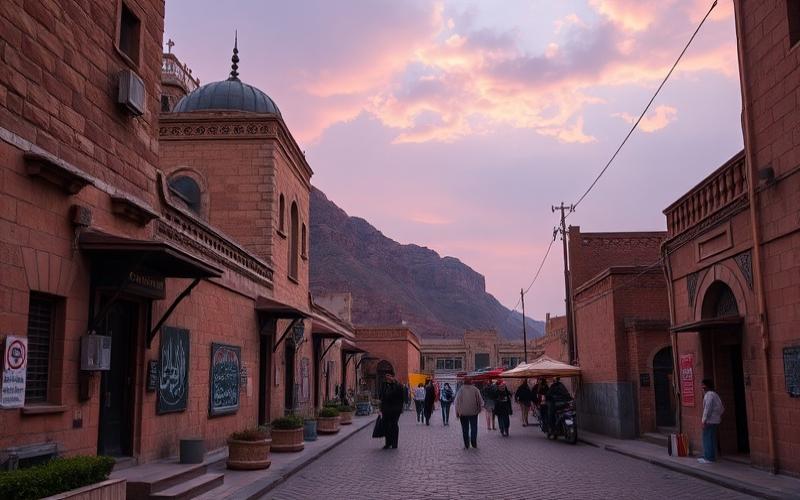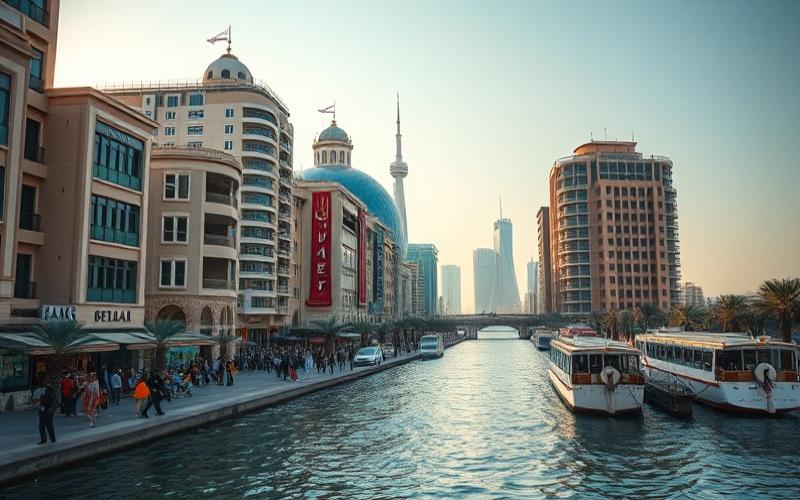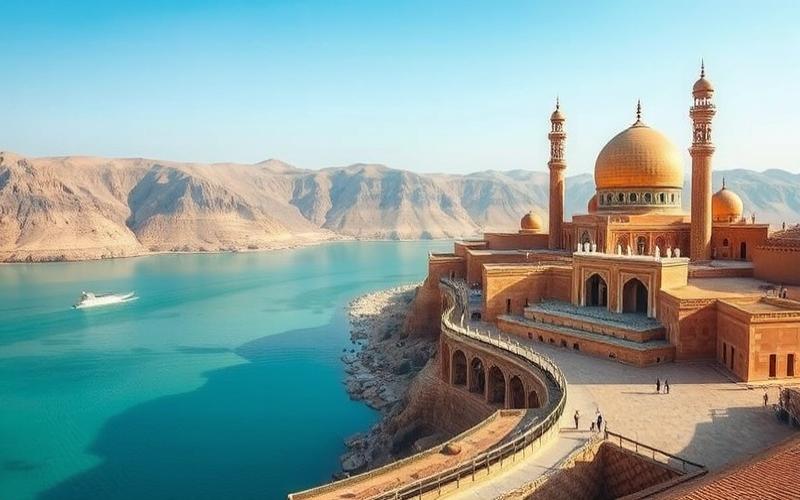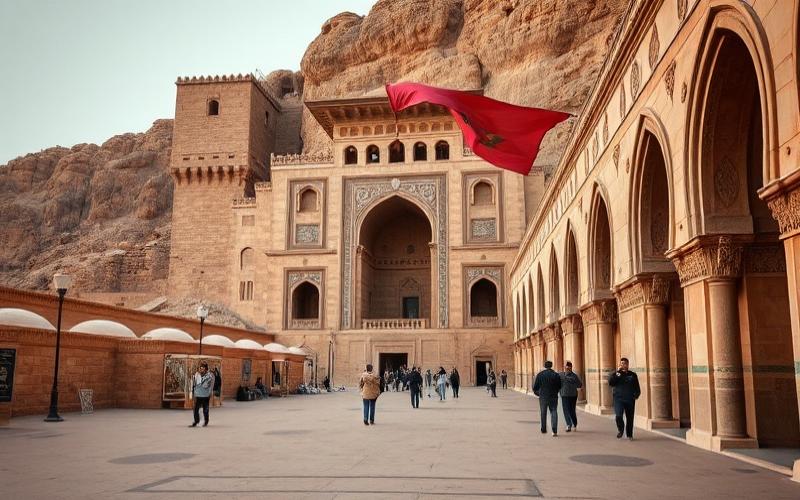
 Published on and written by Cyril Jarnias
Published on and written by Cyril Jarnias
Investing in Bahrain Through a Real Estate Civil Company: Opportunities and Challenges
Investing in Bahrain through a real estate civil company (RCC) presents an intriguing opportunity for many investors seeking international diversification. This tiny kingdom, often considered the gateway to the Gulf, offers a stable legal framework and attractive tax policies for foreigners looking to place their capital.
However, despite its numerous advantages, it also presents specific challenges that are crucial to understand before taking the plunge.
Tax Benefits
Bahrain offers a favorable tax environment for foreign investors, particularly with:
- No personal income tax
- Competitive property taxes
- Exemptions for certain economic activities
Local Real Estate Market
The Bahraini real estate market is characterized by:
- Growing demand in urban areas
- Ambitious development projects
- Opportunities in the rental sector
Potential Pitfalls
Despite the advantages, certain risks must be considered:
- Specific regulations for foreigners
- Local market fluctuations
- Administrative complexities
Good to Know:
An RCC in Bahrain can be an excellent vehicle for optimizing your real estate asset management, but it’s essential to thoroughly study local conditions before investing.
Optimizing Legal Structure: Understanding RCCs in Bahrain
Key Legal Aspects for Establishing a Real Estate Civil Company (RCC) in Bahrain:
- Legal Form: The RCC, as known in French law, doesn’t have a strict equivalent in Bahrain. However, similar structures can be established as civil companies or local commercial companies adapted for real estate investment.
- Registration and Licenses: All companies must be registered with competent authorities and obtain a commercial license. Annual renewal of this license is mandatory.
- Accounting Obligations: Regular maintenance of accounting records and annual audit required for certain corporate forms (joint stock companies, LLCs).
- Land Regulations: Foreigners can acquire real estate in designated areas (“freehold”), but restrictions exist outside these zones.
Specific Advantages of an RCC or Equivalent Structure for Investors in Bahrain:
- Simplified Asset Management
- Centralization and collective management of real estate assets.
- Facilitated transfer through share assignment rather than direct property sale.
- Facilitated Transfer
- Ability to organize succession according to partners’ wishes.
- Potential reduction of inheritance costs through gradual or anticipated transfer via donation/partial assignment.
- Tax Optimization
- Historically very favorable local taxation with near absence of corporate tax for local real estate held by Bahraini entities (excluding large multinationals starting 2025).
- Reduced social and administrative costs.
| Advantage | Explanation |
|---|---|
| Collective Management | Administrative simplification, decisions made in assembly |
| Flexible Transfer | Gradual donation/assignment possible without notarized sale |
| Tax Optimization | Low or zero taxation depending on tax status |
| Asset Protection | Separation between personal and real estate assets |
Administrative Steps Required to Create an RCC/Real Estate Structure in Bahrain:
- Choose the appropriate company type (local civil company or commercial equivalent).
- Submit complete documentation to Bahrain’s commercial registry:
- Articles of association
- List of partners/shareholders
- Clearly defined business purpose related to real estate
- Obtain specific commercial license for the real estate sector
- Open a local professional bank account
- Register with local tax authorities even if no taxation is due in most cases
Typical use for real estate investment:
- Direct or indirect acquisition of residential/commercial properties located in “freehold” zones
- Long-term leasing with exemption on local rental income
Comparison with Other Possible Legal Structures in Bahrain:
| Structure | Main Advantages | Disadvantages / Limitations |
|---|---|---|
| Real Estate Civil Company (or equivalent) | Flexible management; facilitated transfer; light taxation | May require statutory adaptation; less known locally |
| LLC | Limited liability; international recognition | More formal process; increased obligations |
| Joint Stock Company | Easier access to significant capital | Complex governance; higher costs |
The typical “RCC” structure thus offers superior flexibility in asset management compared to more rigid forms like joint stock companies while maintaining administrative simplicity.
Essential Precautions
- Regularly monitor regulatory developments, particularly since the upcoming introduction of a minimum profit tax (>15% starting 2025) mainly targeting multinationals but subject to change.
- Analyze any bilateral double taxation agreement between Bahrain and the actual tax residence country to avoid undue taxation.
Special attention required for cross-border investments where tax reclassification may occur.
Good to Know:
To optimize the legal structure when establishing a Real Estate Civil Company (RCC) in Bahrain, it’s crucial to carefully navigate the country’s legal and tax framework. Notable advantages of an RCC include simplified asset management and streamlined property transfer, as well as tax optimization opportunities through strategies adapted to local laws.
Tax Benefits of an RCC for Investing in Bahrain
Main Tax Advantages Offered by Structuring an RCC in Bahrain
- No Corporate Tax: The vast majority of companies in Bahrain, including real estate civil companies (RCCs), benefit from total corporate tax exemption, with the notable exception of the oil and gas sector. This allows for maximizing net profits and easier reinvestment in new real estate projects.
- Capital Tax Exemption: There is no tax on real estate capital gains or capital, simplifying asset management and portfolio adjustments.
- Tax Flexibility: Structuring through an RCC allows for flexible organization of real estate asset holding and transfer, adapting articles of association according to investor needs while benefiting from the country’s ultra-competitive tax regime.
- No Personal Income Tax: Partners, whether residents or not, are not taxed on income received through the RCC.
Impact of Double Taxation Agreements
- Bahrain has signed numerous double taxation agreements, limiting the risk of being taxed twice on real estate income generated by the RCC.
- This facilitates international investment by securing the taxation of dividends, rents, or capital gains repatriated to the investor’s country of residence.
Incentive Measures for Foreign Investors
- Customs exemptions on many imports necessary for investment or property renovation.
- Simplified business creation procedures and no quotas on foreign capital ownership in several non-strategic sectors.
- Special economic zones offering additional advantages (easier access to land, modern infrastructure).
Tax Planning Opportunities Offered by RCCs in Bahrain
- Optimization of asset holding and transfer through a structure allowing share assignment rather than direct asset transfer, facilitating succession and intergenerational transfer.
- Ability to reinvest real estate profits without tax friction, thus maximizing the snowball effect on overall returns.
- Possible arbitration between different jurisdictions thanks to flexibility offered by international tax agreements.
Concrete Examples of Advantageous Scenarios
| Investment Scenario | Concrete Tax Advantage in Bahrain |
|---|---|
| Non-resident investor wishing to rent a building in Bahrain | Rental income received without corporate tax or income tax, maximizing net returns. |
| Sale of property held through an RCC | Capital gains completely tax-exempt, allowing quick capital reallocation to other projects. |
| Asset transfer to heirs | Ability to transfer RCC shares without local taxation, with simplified succession management. |
| International investor benefiting from double taxation agreement | Real estate income repatriated to country of residence without double taxation, with optimized taxation through agreements. |
Key Takeaway: Structuring an RCC in Bahrain allows benefiting from one of the world’s most competitive tax environments, optimizing real estate asset management and transfer, and securing international flow taxation through an extensive network of double taxation agreements.
These advantages make Bahrain a prime destination for real estate investors seeking to maximize returns while limiting tax exposure.
Good to Know:
Investing in Bahrain through a real estate civil company (RCC) offers numerous tax advantages, attracting many international investors. Among the major benefits are the absence of corporate tax, allowing increased return on investment margins, and capital tax exemption, promoting asset growth without state deductions. Additionally, Bahrain has established double taxation agreements with several countries, simplifying cross-border taxation and avoiding double taxation on internationally generated profits. The Bahraini government also provides incentive measures for foreign investors, strengthening the country’s appeal as a financial hub. The tax flexibility of an RCC further offers considerable tax planning opportunities, enabling, for example, optimized profit distribution to minimize personal income taxes for partners. These advantages prove particularly beneficial for investors seeking to maximize returns while expanding their international real estate portfolio.
Pitfalls to Avoid When Buying Property in Bahrain with an RCC
Main Pitfalls to Avoid When Buying Property in Bahrain via an RCC
Local Legislation and Foreign Investment
- Property acquisition by foreigners is only possible in certain designated areas. It’s imperative to verify the property’s location before any commitment.
- Bahraini law allows 100% foreign ownership of real estate civil company (RCC) capital, subject to obtaining licenses and approval from the competent ministry.
- Foreign companies benefit from tax advantages (corporate tax exemption in certain sectors, no income tax) but must comply with local accounting requirements and employ a quota of Bahraini citizens depending on the sector.
- All investments must comply with legislation on encouragement and reciprocal protection of investments, particularly under bilateral agreements.
Common Mistakes During Acquisition via RCC
- Inadequate Property Valuation: Frequent overpricing in areas authorized for foreigners, lack of rental potential or actual profitability analysis.
- Misunderstood or Poorly Drafted Contracts: Unfamiliarity with local law, ambiguous clauses regarding ownership, resale or management, absence of certified translation into French or English.
- Poorly Anticipated Taxation: Ignorance of applicable local taxes and fees (registration fees, transfer duties, potential future property taxes), poor anticipation of taxation in the RCC beneficiary’s country of residence.
Possible Complications Related to Financing and Management
- Limited Access to Financing: Local banks often require additional guarantees for foreign companies; interest rates and conditions may be unfavorable.
- Mortgage Difficulties: Some institutions refuse to grant mortgage loans to RCCs owned by foreigners.
- Complex Remote Management: Maintenance, rental management or administrative follow-up difficult without reliable local partner; risk of property deterioration or unpaid rents.
Due Diligence and Local Experts
- It’s crucial to consult a lawyer specialized in Bahraini real estate law as well as a local accounting expert.
- Use a licensed real estate agent for valuation and negotiation.
- Conduct complete verification of property title, seller history and any charges or mortgages.
| Pitfall to Avoid | Potential Consequence | Practical Advice |
|---|---|---|
| Purchase outside authorized zones | Transaction nullity, inability to register property | Verify official list of accessible areas |
| Contract non-compliant with local law | Disputes, difficulty reselling | Have contract validated by local lawyer |
| Underestimation of additional costs | Significantly reduced actual profitability | Request detailed cost estimate in advance |
| Absence of on-site management | Deterioration, income loss | Appoint local property management company |
| Unsecured financing | Acquisition blockage, additional costs | Negotiate financing before any signing |
Practical Tips for Successful Real Estate Investment in Bahrain via RCC
- Always verify property eligibility for foreign acquisition.
- Ensure the RCC is properly constituted and registered according to Bahraini legislation.
- Have all contracts drafted or reviewed by a local lawyer.
- Budget including all additional costs (notary, registration, management, maintenance).
- Anticipate taxation on income and capital gains, both in Bahrain and country of tax residence.
- Establish regular property monitoring, either through periodic visits or trusted local manager.
- Always opt for thorough due diligence before any investment decision.
Professional local support (legal, tax, real estate) is essential to secure and optimize property purchase in Bahrain via RCC.
Good to Know:
When buying property in Bahrain via RCC, it’s crucial to be aware of strict foreign investment legislation that may restrict certain property acquisitions; consultation with local legal and real estate experts is therefore essential. Ensure accurate property valuation, as evaluation errors can lead to overpayment or resale complications. Fully understanding contracts written in local language and their implications is vital to avoid unfavorable clauses. Regarding taxation, although Bahrain imposes no income tax or property tax, it’s important to research tax obligations in your home country. Be prepared to face potential financing complications, as mortgage conditions for foreign investors can be strict and require substantial guarantees. Additionally, remote property management can prove challenging, so hiring a local manager is strongly advised. In conclusion, thorough due diligence through regular consultation with local professionals is essential to avoid financial and legal pitfalls and succeed in real estate investment in Bahrain via RCC.
Disclaimer: The information provided on this website is for informational purposes only and does not constitute financial, legal, or professional advice. We encourage you to consult qualified experts before making any investment, real estate, or expatriation decisions. Although we strive to maintain up-to-date and accurate information, we do not guarantee the completeness, accuracy, or timeliness of the proposed content. As investment and expatriation involve risks, we disclaim any liability for potential losses or damages arising from the use of this site. Your use of this site confirms your acceptance of these terms and your understanding of the associated risks.
















































